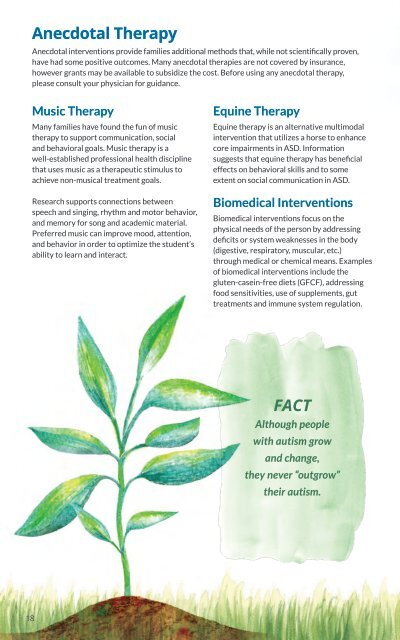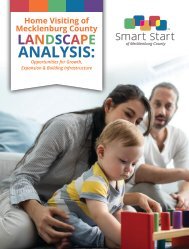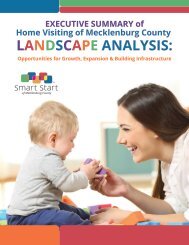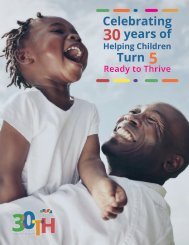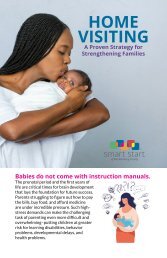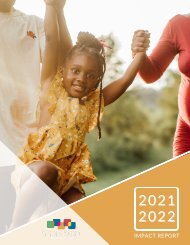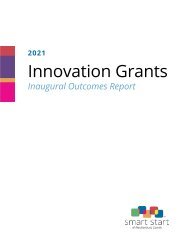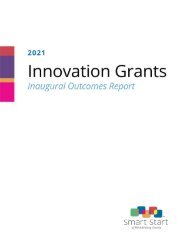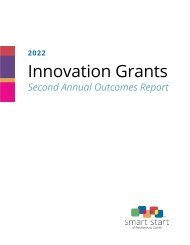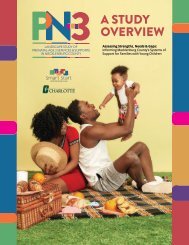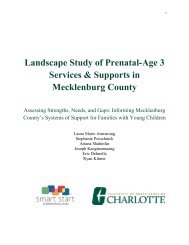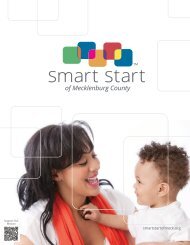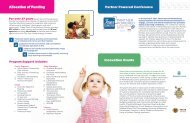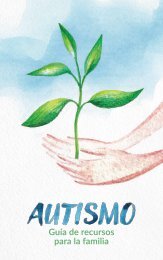Autism Family Resource Guidebook
Guiding Parents to Services (GPS), is pleased to share the new Autism Family Resource Guide. GPS is a funded program of Smart Start of Mecklenburg County. This publication serves as a guide for parents with children ages birth to five as they navigate the world of autism. For more information regarding the publication or the program, please reach out to the Autism Coordinator of Guiding Parents to Services at gps@smartstartofmeck.org. Autism Family Resource Guidebook for Mecklenburg County, North Carolina. ©2021
Guiding Parents to Services (GPS), is pleased to share the new Autism Family Resource Guide. GPS is a funded program of Smart Start of Mecklenburg County. This publication serves as a guide for parents with children ages birth to five as they navigate the world of autism. For more information regarding the publication or the program, please reach out to the Autism Coordinator of Guiding Parents to Services at gps@smartstartofmeck.org.
Autism Family Resource Guidebook for Mecklenburg County, North Carolina. ©2021
You also want an ePaper? Increase the reach of your titles
YUMPU automatically turns print PDFs into web optimized ePapers that Google loves.
Anecdotal Therapy<br />
Anecdotal interventions provide families additional methods that, while not scientifically proven,<br />
have had some positive outcomes. Many anecdotal therapies are not covered by insurance,<br />
however grants may be available to subsidize the cost. Before using any anecdotal therapy,<br />
please consult your physician for guidance.<br />
Music Therapy<br />
Many families have found the fun of music<br />
therapy to support communication, social<br />
and behavioral goals. Music therapy is a<br />
well-established professional health discipline<br />
that uses music as a therapeutic stimulus to<br />
achieve non-musical treatment goals.<br />
Research supports connections between<br />
speech and singing, rhythm and motor behavior,<br />
and memory for song and academic material.<br />
Preferred music can improve mood, attention,<br />
and behavior in order to optimize the student’s<br />
ability to learn and interact.<br />
Equine Therapy<br />
Equine therapy is an alternative multimodal<br />
intervention that utilizes a horse to enhance<br />
core impairments in ASD. Information<br />
suggests that equine therapy has beneficial<br />
effects on behavioral skills and to some<br />
extent on social communication in ASD.<br />
Biomedical Interventions<br />
Biomedical interventions focus on the<br />
physical needs of the person by addressing<br />
deficits or system weaknesses in the body<br />
(digestive, respiratory, muscular, etc.)<br />
through medical or chemical means. Examples<br />
of biomedical interventions include the<br />
gluten-casein-free diets (GFCF), addressing<br />
food sensitivities, use of supplements, gut<br />
treatments and immune system regulation.<br />
FACT<br />
Although people<br />
with autism grow<br />
and change,<br />
they never “outgrow”<br />
their autism.<br />
Appropriately?<br />
Other Health Related Concerns<br />
In the tables below, developmental milestones are listed for children with typical development,<br />
alongside behaviors that may be signs of autism spectrum disorders (ASD). Learning<br />
While the following differences are not defining characteristics of autism, many children may<br />
developmental milestones can help parents know what to expect from their children.<br />
experience these other challenges at some point throughout their lives. These co-morbid<br />
conditions<br />
While looking<br />
typically<br />
at observable<br />
need to also<br />
behaviors,<br />
be addressed,<br />
please<br />
to<br />
keep<br />
allow<br />
in<br />
the<br />
mind<br />
child<br />
that<br />
to<br />
development<br />
regulate and<br />
is<br />
learn<br />
individual<br />
more<br />
and<br />
effectively.<br />
these are the approximate age ranges to observe the expected behaviors for all children. Every<br />
child is different, even among siblings. Your child’s environment, family and experiences contribute<br />
This<br />
to their<br />
list includes<br />
development.<br />
some of<br />
If<br />
the<br />
you<br />
most<br />
are concerned,<br />
common conditions<br />
please talk<br />
present<br />
to your<br />
in<br />
child’s<br />
young<br />
pediatrician<br />
children with<br />
as<br />
ASD,<br />
soon as<br />
however<br />
possible.<br />
additional<br />
The earlier<br />
conditions<br />
concerns<br />
may<br />
are addressed,<br />
develop as a<br />
the<br />
child<br />
better<br />
gets<br />
the<br />
older.<br />
long-term<br />
It is important<br />
prognosis<br />
to have<br />
is for<br />
regular<br />
the child,<br />
visits<br />
whether<br />
with<br />
the<br />
your<br />
delay<br />
doctor<br />
is indeed<br />
and intervention<br />
autism or something<br />
team to discuss<br />
else.<br />
any changes in your child as they<br />
happen. Please talk to your pediatrician if your child is having any of these difficulties.<br />
Disrupted Sleep<br />
Sleep difficulties typically fall into two<br />
general categories: difficulty falling asleep<br />
and difficulty staying asleep. Children may<br />
exhibit signs of one or both categories. Lack<br />
of sleep can intensify other issues that a<br />
child is already experiencing.<br />
UNDER 12 MONTHS Typical Development<br />
Gastrointestinal Issues<br />
Attention Deficit<br />
Hyperactivity Disorder<br />
(ADHD)<br />
ADHD typically is known as an inability<br />
or difficulty in focusing. While it can be<br />
difficult to separate focus issues from other<br />
signs of ASD, some children have this<br />
Red Flags for <strong>Autism</strong><br />
additional challenge. Spectrum Disorder (ASD)<br />
Developmental Coordination<br />
Many Social children Interaction experience some • Babbling type or of coos and smiles in<br />
• Tends not to turn to someone<br />
bowel distress off and on through response their<br />
calling their name and seems not<br />
Delay to hear or be interested; seems to<br />
lifetime. Most commonly, children • Turns head may and have pays attention<br />
constipation or diarrhea. In some children,<br />
In addition to other hear environmental delays, some sounds children better<br />
towards sounds and voices or where<br />
than human voices<br />
you are looking and pointing<br />
the experience of pain may result in feeding experience a delay in the development of<br />
difficulties, which may have a sensory<br />
motor skills. These • Fails can to look include where but someone are not is<br />
• Shows interest in faces<br />
pointing<br />
component as well.<br />
limited to delays in walking or showing an<br />
unusual posture • Absent or walking facial expression, pattern, lowered such as<br />
decreased smiling or upset/scared<br />
muscle tone or balance issues. Smaller muscle<br />
face<br />
groups may also be impacted, effecting<br />
Communication<br />
• Cries differently for different hand-eye needs coordination • Delayed and infrequent handwriting. sounds<br />
(e.g. hungry vs. tired)<br />
of speech<br />
Behavior/Interests<br />
• Makes eye contact and maintains for<br />
moving objects (even for a short time)<br />
• Responds to “no” and simple directions<br />
(e.g. “Come here”) and says one or<br />
two words<br />
• Join to sound/rhythm by making or<br />
repeating sounds<br />
• Explores different toys and/objects<br />
with fingers and mouth<br />
• Show physical reaction when excited<br />
• Limited eye contact and may not<br />
look where another is looking<br />
• Does not wave bye-bye<br />
• Attending to unusual objects or<br />
patterns<br />
• Over- or under-reactions to<br />
stimulation<br />
• Repeats a movement or routine<br />
over and over<br />
6<br />
<strong>Autism</strong> Co-morbid Spectrum Disorder<br />
<strong>Autism</strong> Presence is a of neurodevelopmental one or more additional disorder conditions defined co-occurring by persistent with deficits the in social<br />
communication primary one. and social interaction, accompanied by restricted, repetitive<br />
patterns of behavior, interests, or activities.<br />
18 19


